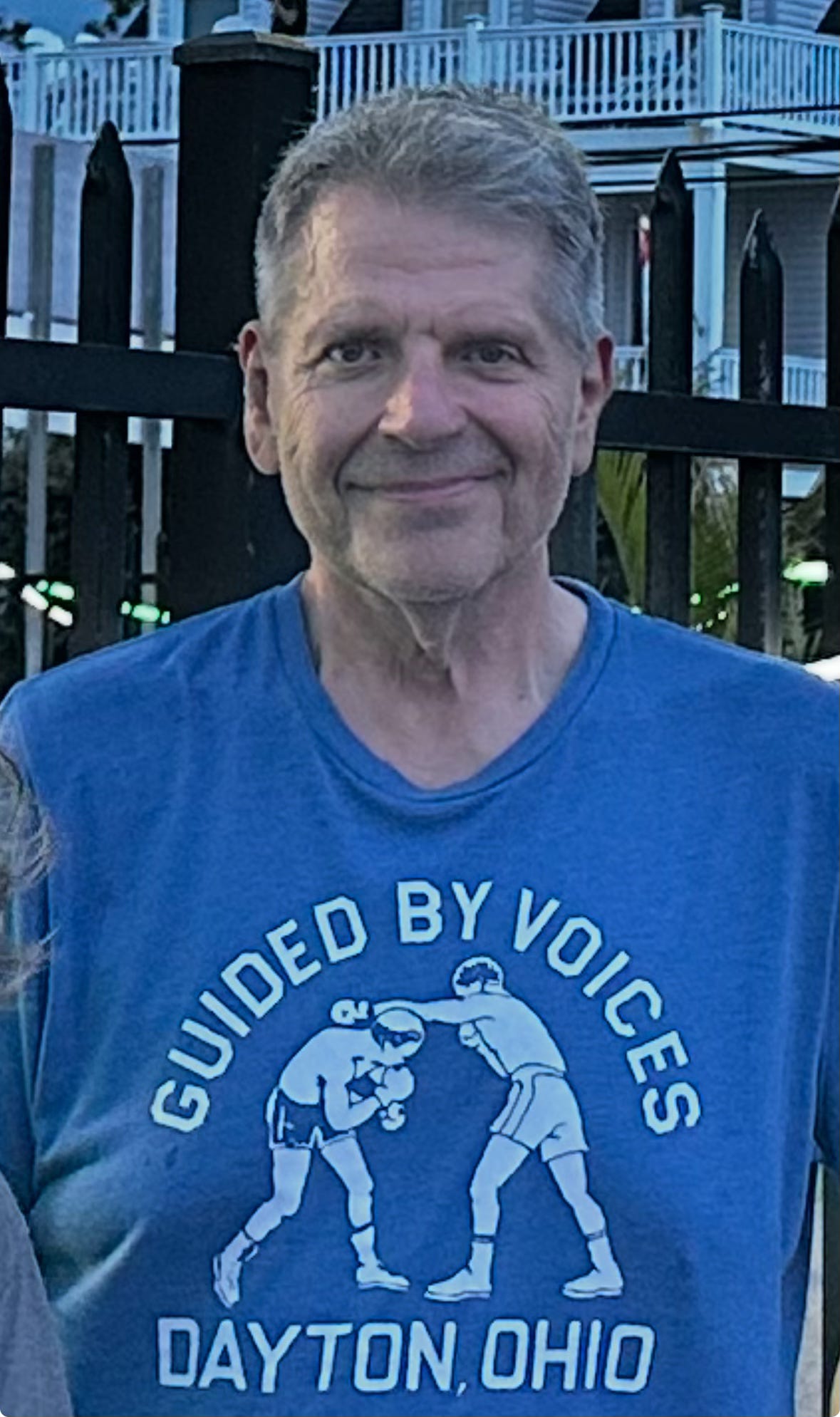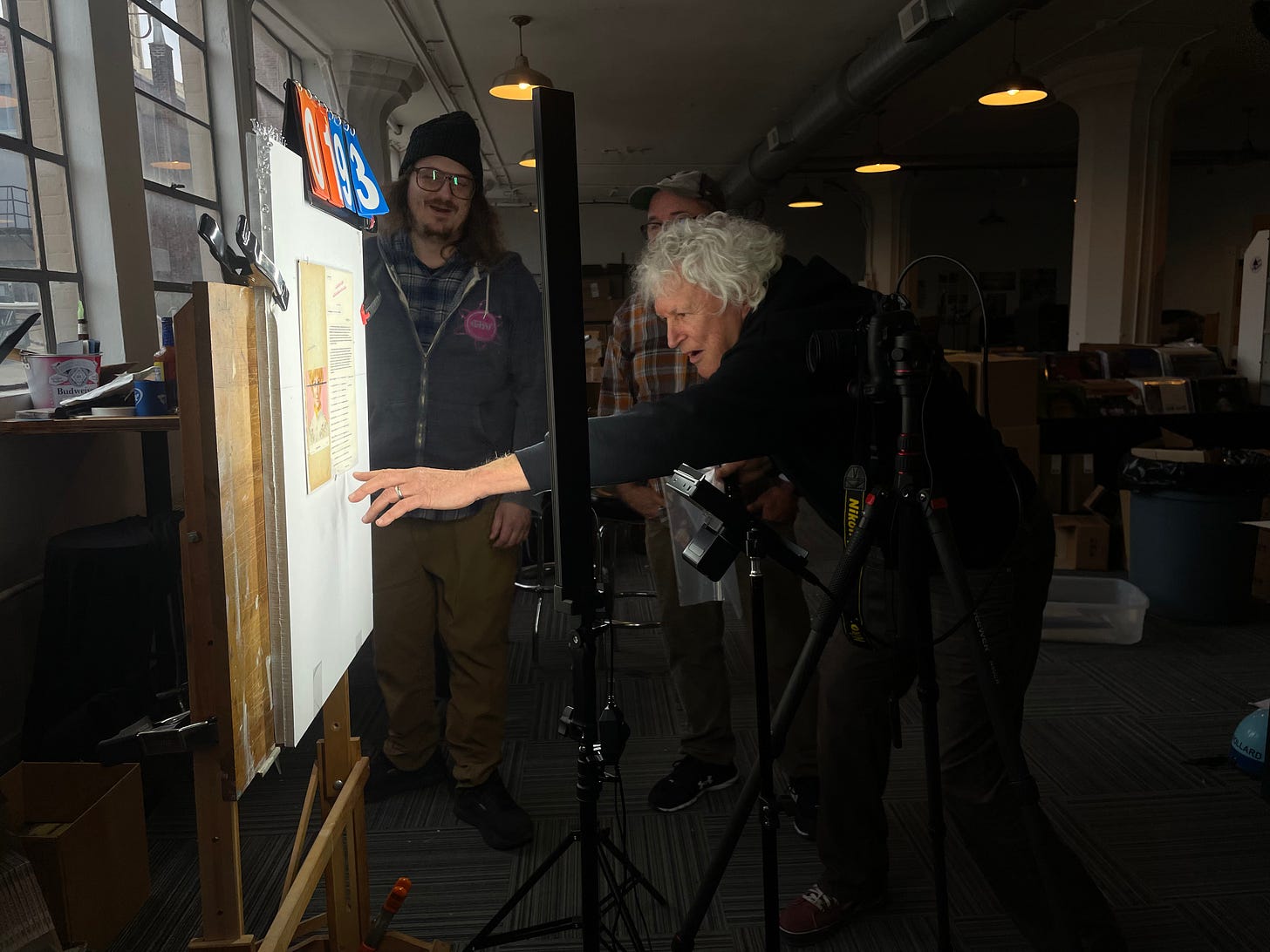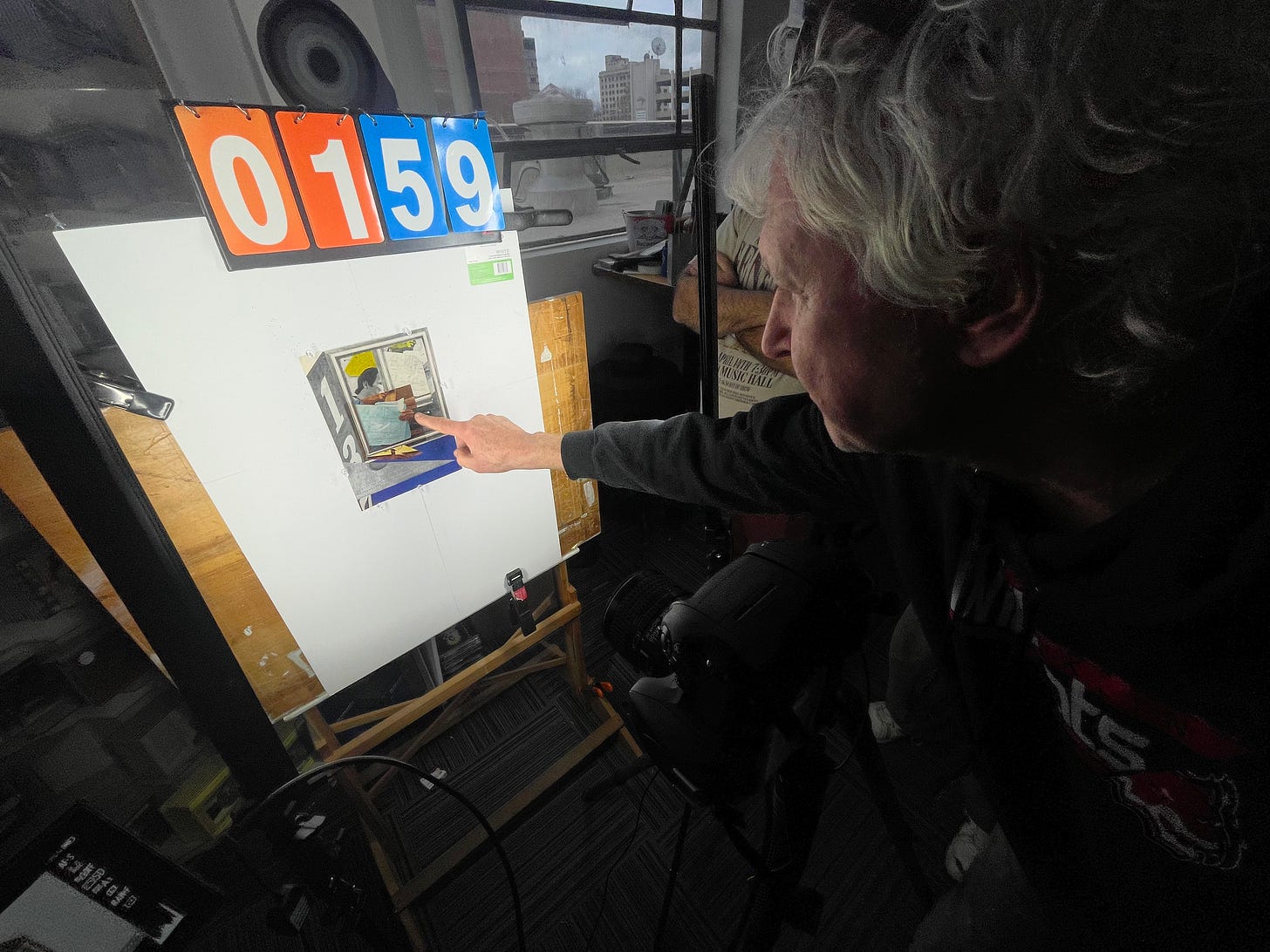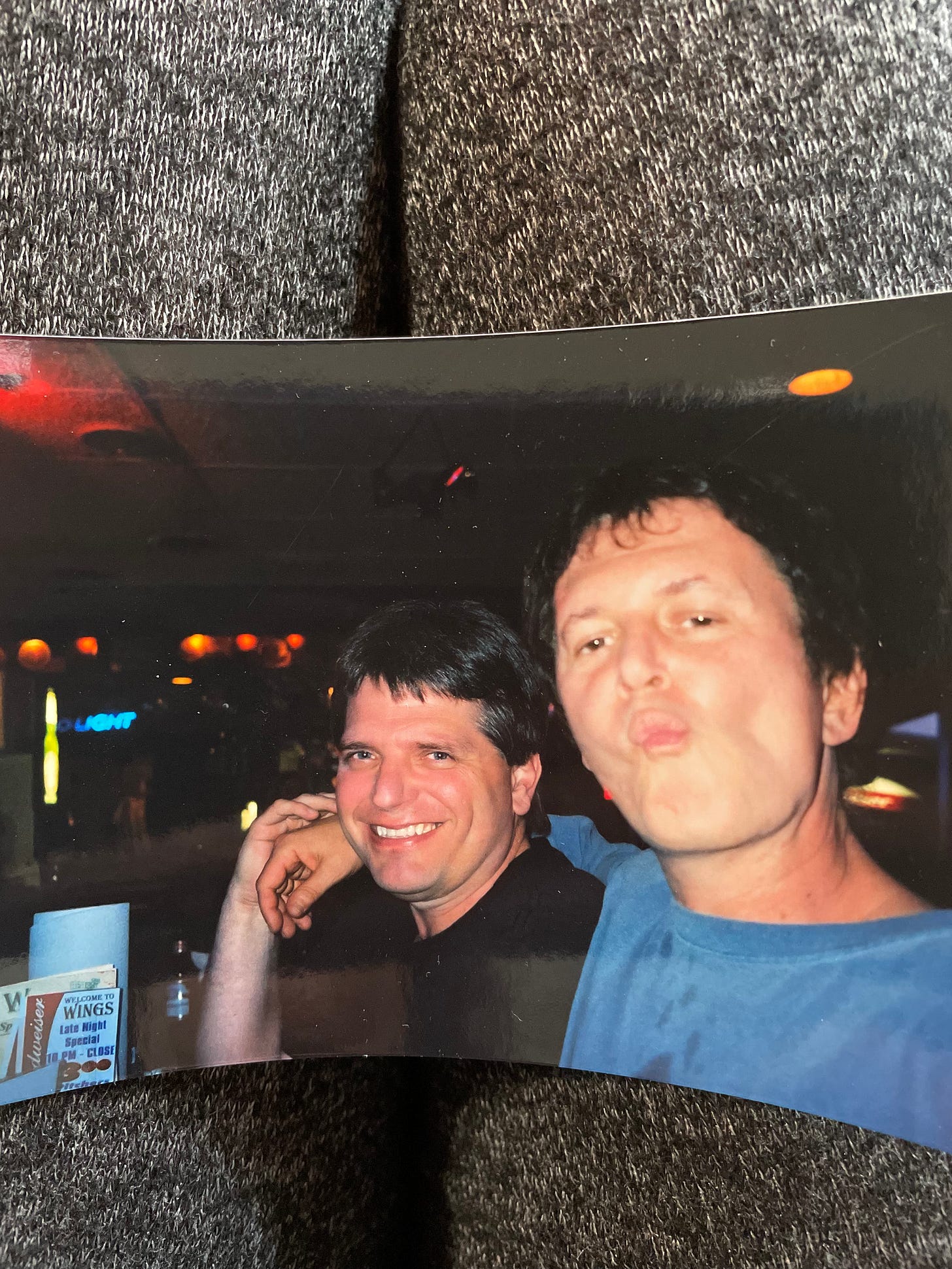Keep It In Motion, Keep It In Line: A Conversation with Rockathon Records' Mike "The Heed" Lipps
The first-ever interview with a key Guided by Voices figure — one there almost since the beginning, and the namesake of Heedfest, an annual GBV fan convention in Dayton.
For decades inside the Guided by Voices orbit, there has been a quiet constant: Mike “The Heed” Lipps. Long before message boards, reunion tours, or limited-run vinyl drops, he was there — first as Robert Pollard’s brother-in-law, then as a close friend, and eventually as a steady presence within the band’s small, fiercely independent world.
Most fans know his name because of Heedfest, the annual GBV gathering in Dayton. What began as an offhand invitation — come out here, we’ll cook out — turned into a pilgrimage, with fans flying in from around the country and overseas to marinate in the milieu that made GBV possible. Lipps didn’t set out to create an event — it just became one.
Today at Rockathon Records — the tiny, analog label/merch/mail-order operation that moves Pollard’s endless output into the world — Lipps works alongside longtime partner Matt Davis. There is no staff. No office hours. Orders go out when real life allows: late at night or at dawn on weekends, music up loud, boxes everywhere. Between them, thousands of records are packed and shipped by hand.
Lipps still holds a full-time job managing a chemical company in Dayton. Rockathon, he says, is “the job we get to do.”
After a difficult year, Lipps was diagnosed with cancer and had to step away from Rockathon — missing Heedfest for the first time since it began. Now back where he belongs, he talks about it without self-pity, focusing instead on how routine, humor, and community help him, as a great man once sang, “keep it in motion.”
Guided by Voices has always been a labor of love: tapes dubbed by hand, sleeves folded in basements, packages mailed before or after work. The Heed embodies that ethic — and this is his first interview.
GBV’s new album, Thick Rich and Delicious, arrived October 31 via GBV, Inc. To order it, click here. To read the Excited Ones! interview with Matt Davis, click here.
You’re telling me you’ve never done an interview?
I haven’t, no. I’ve never done one.
Not even with the local paper during Heedfest?
They’ve asked a couple of times, and I’ve always said, “No, Matt can handle it.”
Well, I’m honored. How was Heedfest this year?
It was great this year. Really special for me, because I had to miss it for the first time, because I had just gotten a cancer diagnosis three weeks before. I was having some issues, and I just couldn’t do it, even though I kind of started it. It was the first one I missed, and it was sad. So, going back this year, I really needed to see everybody. It was a really, really good boost.
I’m so sorry to hear you’re sick. How are you feeling?
Oh, you know, I feel great. I was kind of homebound for almost a year because of all the side effects and stuff. A surgery this past June kind of freed me up to do things. That’s why I’m able to get back out. I’m still in treatment, but I haven’t lost my hair; I haven’t gotten sick through chemo.
Well, you sound good. Energetic.
Yeah, it’s funny. I get the albums shipped into Gem City where I work at the chemical plant, because we have a dock. He came and picked the records up, and we were talking. And he goes, “Well, ‘least your hair is thick, rich, and delicious!” So, that was good.
That’s lovely. But this all sounds really scary at the same time.
Yeah, yeah, it is. But you know, hey — just got to keep it in motion.
Is that kind of a Midwestern thing — playing it cool and powering through stuff?
I think so. Yeah, I think it really is.
How did you become involved with Robert in the first place?
Well, I was dating his wife’s sister. I knew of Bobby, but I really didn’t know about the band. And then, through dating her — she had the first four albums: Forever Since Breakfast, Sandbox, Devil Between My Toes, and Same Place the Fly Got Smashed. I listened to those nonstop — man, just amazed at how great these songs were. It was all four track, and it kind of sounded rough and stuff.
Then my first concert to see them was at Bogart’s [in Cincinnati], and I was just blown away at how big it sounded, and their stage presence. I was like, Man, this is a huge thing. And just from that — yeah, that’s how I got involved, and I ended up marrying her. So, Bob and I were brothers in law for a while.
What was that like?
It was really cool. Funny story: the first night that we really hung out, believe it or not, we were at the in-laws, or our wives’ parents, playing Trivial Pursuit. I didn’t really know Bobby at that point. At one point, he goes, “I like you. You’ve got half a brain!”
And I took offense a little bit. I’m like, Man, he kind of took a shot at me. I brought it up to him later, and he said, “No, man, you don’t realize that’s a compliment,” because of my wife’s history. “She usually brings around idiots, and you’re pretty smart. That’s for the first time!”
So, that was great. It was a good, good first experience.
What happened from there?
After that, I started going over to [Bob’s storied drinking club] the Monument Club occasionally and hanging out with the guys. And then he gave me a tape. We were going on vacation, and he didn’t go. He gave me a tape of Bee Thousand before it came out, and I just played it nonstop. And then I was just hooked after that.
You described their energy, their stage presence, how big they sounded. But what about these songs themselves spoke to you? However abstractly, they’re about heavy, human topics to me, but with a lot of uplift.
Well, you know what? That’s a good point. So, a lot of my friends, we talk about our favorite songs, and there’s quite a few of them that we call “sad but triumphant.” Like “Everyone Thinks I’m a Raincloud (When I’m Not Looking)”:
‘Cause this is not my day
And nobody really cares anymore anyhow
And nobody called again
’Cause they say that I’m too lazy to stay alive
Every day it’s another world and every change of tomorrow
Hungover and hungry to fix it
A miracle cure for my sorrow
And just how his songwriting has progressed over the past 40 years. You know, I had an epiphany the other day. I was driving back from the East Coast by myself, and I had a 10-hour drive. So I listened to every Guided by Voices or Robert Pollard solo album I could. And in fact, I kind of got emotional.
I had to call him on the ride, and I said, “I can’t think of any artist in any medium — painting, filmmaking, writing, or anything — that has been as prolific as you, and you’re better now than you were then. How is it possible that you’re better 40 years later, and still cranking out everything, and every album’s different, and it’s not the same old stuff?”
I just don’t think there’s been anybody like him in any medium of art.
I’ve only met him once or twice, but he’s one of my heroes.
Yeah, oh, he’s incredibly gracious to people. You know, at Heedfest, I’ve seen him stand for four hours, with people lined up to talk to him and take photos with him. He does it every time.
The fest would probably have not gone past year one or two if not for his involvement and how gracious he is to the fans and how he’ll come and take part in it. I think Matt told you: people come from all over the world to Heedfest, and they’ll kind of stand back [intimidated] and go, “That’s Bob over there.” And we’re like, “Yeah, go say hi to him!”
He seems very private, but also like he feeds off that mass energy — like he could talk to anybody forever.
Yes, he’s a born entertainer. And I think if he wasn’t a rock star, he’d find something else to entertain people.
Last Sunday, we went to Rockathon, and they were doing the photos for the next EAT collage book. But what’s fun about it is like [GBV historian and insider] Rich [Turiel] said in his interview:
Any time you do anything and you’re with Bob, it’s better than anything you would do on your own. Any normal thing, like going out to eat — when you do it with Bob, it’s just better.
I think something that he instilled in me is this commitment to have everything just be great. Everything he does should be great. Going out to a meal, hanging out at a bar, watching a football game — everything should be great about it.
There’s this expected greatness in everything you do, and every moment should be the best moment of that thing you’re doing at that time. Every time you go into a studio and record an album, every collage you make — everything should be great.
I feel like, in some ways, I take that with me in everything I do. In my life now, I want everything to be great. I want every person I meet to be great. I want my doctor to be great. I want my job to be great.
Yeah, that part blew my mind.
I had never even thought about that before, but it’s so spot on. Every time you go out to have dinner with him, it’s the best time ever. You go out for beers, it’s the best time.
We’re privileged enough when the band, before they would tour, they’d practice there, and you’d get to go watch the practice. It was like a show; he was just fired up.
My point was: taking the photos for the EAT magazine, just how animated and excited he gets, explaining every collage as he puts it up. “I got this piece here,” and “I got this piece there.” He takes such great joy in everything. It’s just contagious.
And to Rich’s point, it’s like that with everything with him. It’s heartwarming, and I don’t know anybody else like that, but it’s fun to be around. He’s one of the nicest guys you could ever meet — him and his wife Sarah.
Lots of things have come up that we could do. People come to him like, “Hey, we could do another documentary, or we could do this,” and 99% of the time, he turns it down. I think Matt came to him with a potential thing to do — “This guy’s a big filmmaker” — and Bob said, “I’m as famous as I want to be.” That’s always stood out to me.
In Dayton, honest to god, very rarely does anybody come up and recognize him. I work at a chemical company, and when I deal with people who come into my office and see Guided by Voices stuff — salesmen and things like that,” they always ask me what it is. And I tell them about the band, and they’ve never heard of them.
I thought he was kind of a local celebrity, especially given Heedfest.
Well, he is — [because of] younger people who are into the music. He gets recognized for that. People our age don’t know him, other than seeing him hanging out. But he’s really popular with the college age.
This is what’s also cool: my granddaughter goes to Ohio University, and when Bob would be on vacation or something, we’d go out and feed his cats. At Ohio University, she’d occasionally run into somebody wearing a Guided by Voices shirt. She’d tell them, “Oh, yeah, that’s Uncle Bobby. I used to feed his cats.” They just could never believe it.
So, she sees a lot of kids on the college campus with Guided by Voices stuff. Even though he’s older, he’s still popular among the younger, so that’s great.
I love how rooted he is. He lives 15 minutes from where he grew up.
I’m glad you brought that up, because I had made a note to bring this up. So, when Bob broke up the band at the end of 2004 and came up with From a Compound Eye, his first [post-GBV] solo project, the last song on the last Guided by Voices album at that time [2004’s Half Smiles of the Decomposed] was called “Huffman Prairie Flying Field.”
Where the Wright Brothers learned to fly, near Dayton.
To me, that’s his statement. That’s how much he loves home.
And now I’ve come back, translucent and peeled
At Huffman Prairie Flying Field
He could have moved to New York a long time ago, but he just loves home. He loves going out drinking with his buddy, Bruce. That’s his best friend, Bruce Horner. His longest-time friend, I’m sure. His main hang buddy. I don’t think he’ll ever leave Dayton. He just loves it.
At Heedfest in the early days, people would come up and I’d go, “Where are you from.” They’d go, “We’re from New Zealand.” I’m like, “Man, sorry you came all that way. Dayton’s kind of humdrum.” They’d go, “Are you kidding me? This is like going to Abbey Road or something.” They were just so happy.
In the first few years of Heedfest, we’d rent a tour bus and take them to all those sites that were in the Watch Me Jumpstart [documentary]. They loved getting to see all that stuff in person.
All the locations from the video are still there? Still recognizable?
Oh, yeah, yeah. The funny part, too, was, we’d go by Bob’s parents’ house and they would come out and wave at the bus. It was just so sweet of them to do that. It was pretty cool.
How did Heedfest start in the first place?
So, at the start of the 2000s, there was a Guided by Voices fan message board called Disarm the Settlers.
Was that the same thing as Postal Blowfish?
No, that was after. But when we got to know a lot of people there, every time there’d be a show in a certain city where there were a lot of them — we called them “Settlers” — everybody would get together for a pre-show hang. That went on for three or four years. In Philadelphia, we’d all meet; in New York, we’d all meet; in Chicago, everybody would meet.
Then, when Bob had decided he was going to stop touring around the end of 2006, I just kind of jokingly said, “Hey, well, you guys just all come out to Dayton and we’ll have a cookout and listen to music or whatever. Everybody was lamenting the fact they wouldn’t get a hang again. I knew of the Polish Club picnic ground, so I went, “We’ll get that. We’ll have a cookout.”
Well, 80 people ended up showing up from all over the country. I got ahold of Matt, and I was like, “I don’t even know what we’re going to do here.” So we just cooked out that time and brought a bunch of beer. Then, from. there, after Bob and a couple of guys in the band hung out, we decided we had to keep doing it.
So, it turned into renting buses, having a caterer come in and cook food on the spot, getting 100 cases of beer delivered, and several tribute bands playing and stuff. It went on every year after that.
Tell me about your job at the chemical factory.
First of all, you know what? I have been at this job for 48 years.
Wow.
Yeah, I started working there right out of college. Actually, I was still in college when I started. June 30, 1977 is when I started. And I’ve had every job there. I started working filling chemicals, then I started working in the warehouse, loading trucks, then I drove a truck. Then, they asked me to go into the office, into sales, and I was a salesman for a few years, and then I just eventually started taking over more and more jobs.
Now, I’m the general manager. I gave them notice that I’m going to retire at the end of last year. But I’m not retiring from Rockathon — because, as Matt said, “That’s not a job we have to do. It’s a job we get to do.”
In fact, I did it this morning. My favorite thing to do is to get up at six or seven in the morning on the weekends, and go down there, crank music, package records, and send them out.
You guys do this at night and on the weekends.
Yeah, we’re almost never there during the daytime. I don’t know how the hell Rich did this by himself. But when we started out as the three of us, it was chaos. But Kevin [Poindexter] has since retired; he backed away from it a few years ago, and Matt and I were doing it.
[Sometimes] there’s a new release where we have six, 700 orders to ship out, and we’re there every day. Other than that, I’ll go once a week, or he’ll go once a week. And it’s in the evenings, or the crack of dawn on weekends.
As I told you, when I got diagnosed last year, I stepped away from Rockathon for a year, and Kevin came back in and started working for me. A couple other people helped out. I just consider myself lucky that I have friends like that, that’ll step in for me. Offering to drive me to appointments and stuff, which I don’t need, because I can do it. But, you know, everyone’s been so great.
When you’re dealing with a scary challenge like cancer, laughing and being with your friends and cranking music and packaging records must be tangibly, physically therapeutic on some level. The mind-body connection.
Yeah, absolutely. It makes me happy, and I need that. I needed to be back at it and around everybody. It’s just the best.
How’s your family?
Great. I’ve got one daughter and three grandkids. I told you the one — she’s a senior at Ohio University — and two grandsons, 19 and 14. I get to hang with them quite a bit, so that’s good.
I’ve heard from friends who are grandparents that it’s great to play with the baby, but then hand the baby back and go to sleep.
There’s a funny story. When I was working in the warehouse, an old truck driver used to come in, and he was talking about his grandkids coming to visit. I said, “Man, I bet you’re happy to see your grandkids. That’s nice.” He goes, “Happy to see ‘em come, happy to see ‘em go.” That was a great one.
Are you a sports fan?
Oh, yeah, big sports fan. I’ve got four football games on the screen right now.
What’s happening on those screens?
Well, we just finished Ohio State. Most of us are Buckeyes fans. They’re number one in the country. And I like pro football, like the Cleveland Browns, much to my detriment. Baseball fan, too. Whatever season it is, I have sports on constantly. It’s either work, watching sports, or hanging with the kids.
What do you like about the Browns?
Well, I would not suggest being a Cleveland Browns fan, I’ll tell you that. But growing up, they were the only pro football team in Ohio at the time, and my dad was a fan. They were the only one on television, so I grew up with them. And then, in the mid-’80s, they had a run there where they were in the championship game for three or four years.
It’s an emotional connection.
Yeah, it just stuck with me. They’ve never even been to the Super Bowl, so the season ends in heartbreak every year.
It’s like a bad girlfriend or something.
I don’t know why we do this.
Where do other GBV people’s sports allegiances lie?
I don’t know that any of the other guys in the band are huge sports fans, but Bob is a massive sports fan. He likes the Ohio State Buckeyes like I do, the Cincinnati Reds like I do. And the rival of the Browns here in Ohio is the Cincinnati Bengals, and he’s a Bengals fan.
There’s a funny story with that [which explains] why we don’t watch pro football together. It was 1994 or 1995. The Browns came back after they were gone for a while. A bunch of us were over at the Monument Club, which is the garage behind Bob’s house, watching the Browns and the Bengals. The Browns were winning the game, and with 11 seconds left, in a fluke play, the Bengals got a touchdown and won the game.
I, after having several beers, grabbed a full beer, and my intention was to throw it at the big screen. At the last second, I got my better sense, and I threw it, and it stuck in the wall. There was stunned silence from everybody, and then Bob started laughing his ass off.
This would be akin to throwing a rock at it.
I was gonna throw it through the television. Then I realized it was not my television. We’re on the phone a lot during Buckeyes and Reds games. But we have a little deal where after Browns and Bengals games, we don’t call each other for a couple days.






Amazing! Just discovered your Substack! I’ve ordered every new release from Rockathon (as long as it’s CD!), and always been amazed that the order ALWAYS arrives before street date…LIKE ALWAYS a week or two early! Thanks to Mike “The Heed” Lipps!
Another great interview. The Heed is such an amazing guy and it came through here.